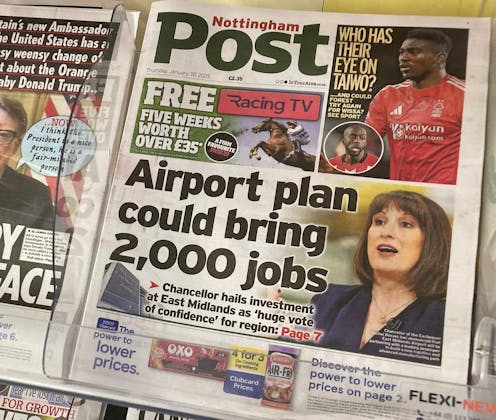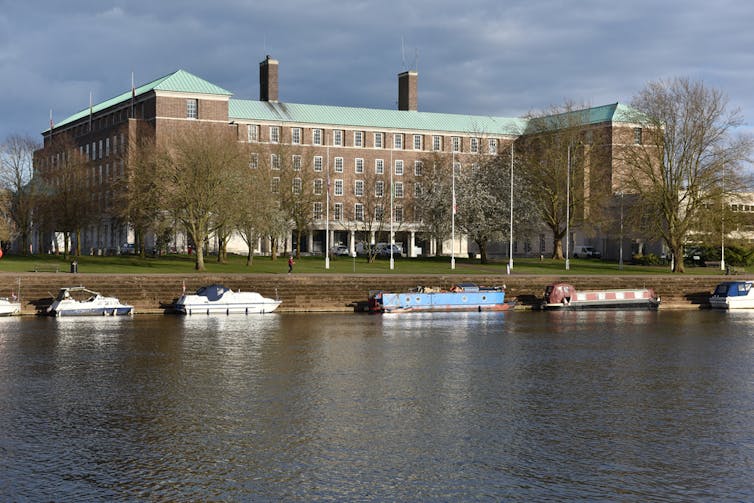
The proposed reorganisation of council boundaries was probably not the issue which prompted British voters to elect hundreds of Reform councillors at May’s local elections.
Nigel Farage’s surging party won 677 seats and gained control of ten councils, including Nottinghamshire in the East Midlands. There, a choice about whether the districts of Gedling or Rushcliffe should be included in a redrawn Nottingham city council has led to an apparent split in the new Reform council contingent. This was reported by Nottinghamshire Live, the online brand used by venerable local newspaper the Nottingham Post.
Council leader Mick Barton was so angry, he banned all his Reform councillors from speaking to Nottinghamshire Live. Its journalists won’t be sent press releases or be invited to council events.
Requests for interviews will be rejected, although they can still attend council meetings held in public. The same goes for its BBC-funded local democracy reporters.
Branding the article “misinformation”, Barton said he welcomed “scrutiny” but added: “We also have a duty to protect the credibility of our governance and the voices that we represent. For this reason, we will not be engaging with Nottinghamshire Live or with any other media outlet we consider to be consistently misrepresenting our policies, actions or intentions.”
Nottinghamshire Live editor Natalie Fahy pointed out this rather goes against Reform’s stated interest in upholding free speech and transparency, and warned: “When the press is not welcome, you know democracy itself is in danger.”
A Guardian editorial called Barton’s decision “petty and alarming”. Spokespeople for the other main UK parties chimed in, with the Liberal Democrats fretting about Donald Trump-style politics. Even Reform UK backed away, with a national party spokesperson saying it supported free speech and it was up to the local party to explain its decision.
There was already a bit of history between local reporters and Nottinghamshire Reform’s group of mostly inexperienced politicians. An excruciating video interview with Reform councillor James Walker-Gurley was widely shared online in June. It’s fair to say he was not yet fully across his cabinet portfolio of economic development.
Local journalism and democracy
This gets us to why it matters. Reporting local politics is a classic function of journalism. The fact that our politicians regularly meet, consider business and debate issues in public has long been part of democracy.
But hardly anyone actually goes to council meetings. It is journalists who can keep a close eye and tell us all what’s happening, including Nottinghamshire’s 800,000 plus residents.
Not that scrutiny means constant criticism. While councillors and reporters often do bump up against each other, studies of the local press have generally bemoaned it for being more of a lapdog than a watchdog, guilty of skirting controversy and avoiding proper scrutiny of institutions.
In their seminal 1973 book on local government and the media, researchers Harvey Cox and David Morgan argued local newspaper editors have always been interested in “the good of the town” as a general concept, and those editors are therefore in favour of anything that fits into this theme rather than being too negative.
A broadly constructive connection between town hall and local paper is normal and helps both sides, in turn allowing citizens to be better informed. Reform’s posturing in Nottinghamshire harms its relationship with a key player that may be as likely to help trumpet the party’s successes as point out its failures.

While Reform’s attitude to reporters in Nottinghamshire is a concern, a far bigger threat to local journalism than grumpy politicians is money, or the lack of it. The business model of newspapers has been under desperate stress for two decades, as advertising cash floods to digital platforms and print sales decline.
In 2007, the local sector employed about 9,000 journalists and had revenue of £2.4 billion. By 2022, those figures had declined below 3,000 and £600 million.
Consigned to regional hubs and home offices, local journalists are no longer working for grand civic institutions. However, flexible use of digital publishing tools and a continuing commitment to public interest journalism, alongside lighter content, has kept titles such as Nottinghamshire Live prominent in our social feeds.
In the US these trends have moved faster, so we can see where we might be heading. In last year’s presidential election, Donald Trump won 91% of counties which are so-called “news deserts”. These are areas without a remaining professional source of local news. Voters in these places turn more to national media and therefore make choices based on national issues, not local ones.
American academics Danny Hayes and Jennifer Lawless have argued this decline in local media makes it harder for citizens to hold politicians accountable. There becomes less incentive for politicians to do their jobs ethically, and their policies may be less likely to reflect the will of the local electorate.
This is what we can see the beginnings of in Nottinghamshire. Where journalists face a battle to find out what’s going on at the council, residents will know less about their areas. Politicians can operate more in the shadows, only appearing to deliver prepared soundbites on their own channels.
These fraying connections in local public-life mean residents may soon discover the council is not following their wishes, whether on boundary changes or anything else. If Reform’s example becomes the new normal, everyone loses.
This article features references to books that have been included for editorial reasons, and may contain links to bookshop.org. If you click on one of the links and go on to buy something from bookshop.org The Conversation UK may earn a commission.
Richard Jones does not work for, consult, own shares in or receive funding from any company or organisation that would benefit from this article, and has disclosed no relevant affiliations beyond their academic appointment.
This article was originally published on The Conversation. Read the original article.







